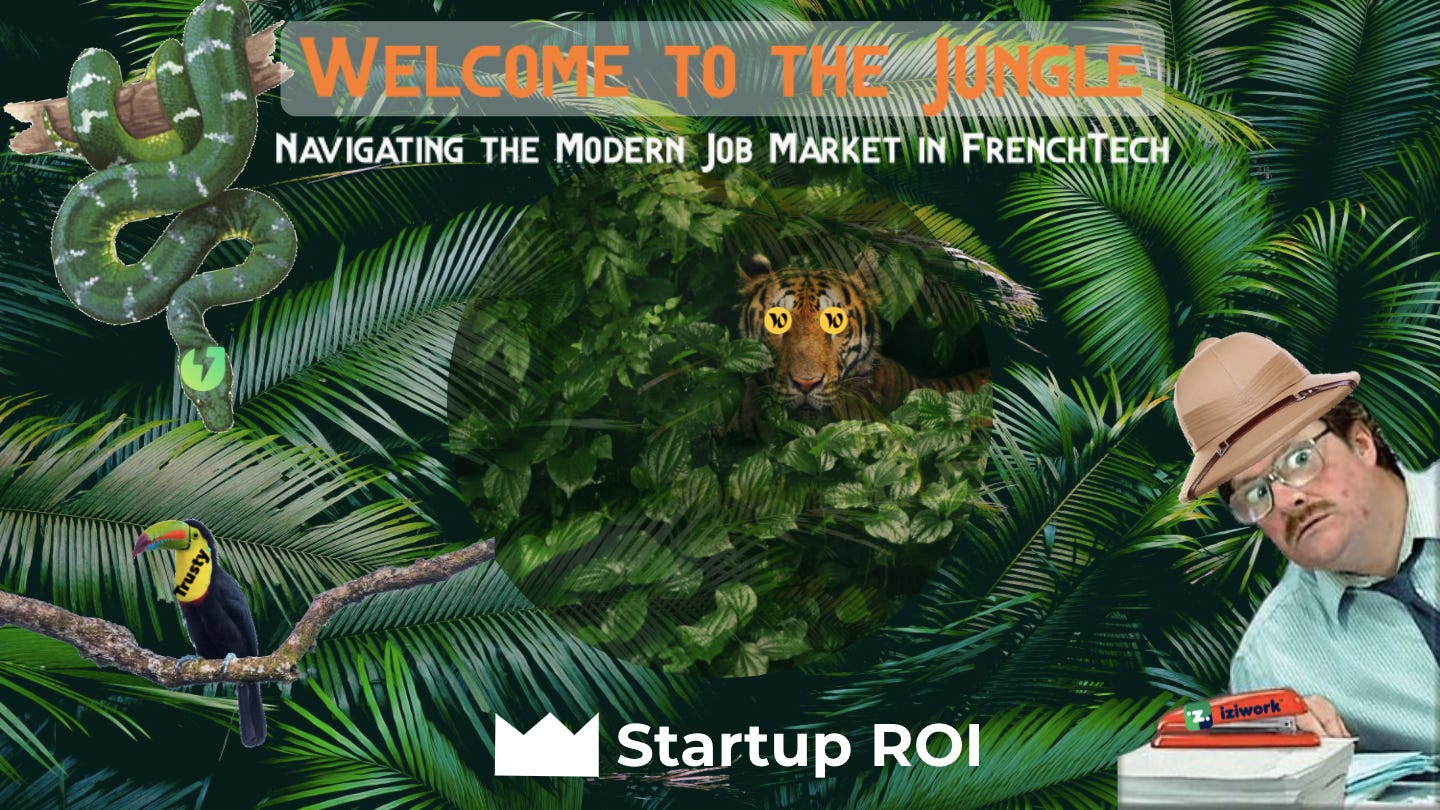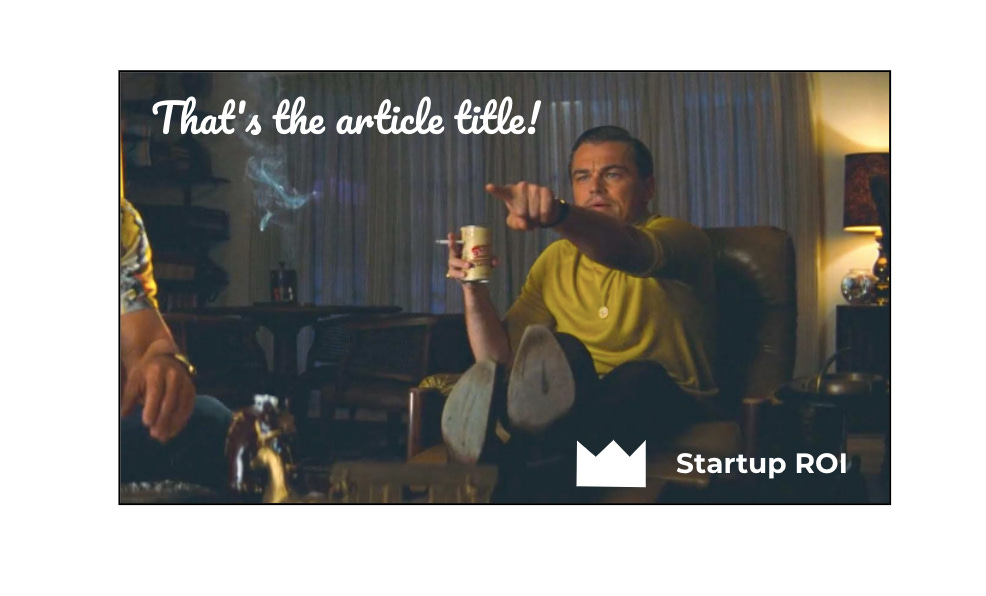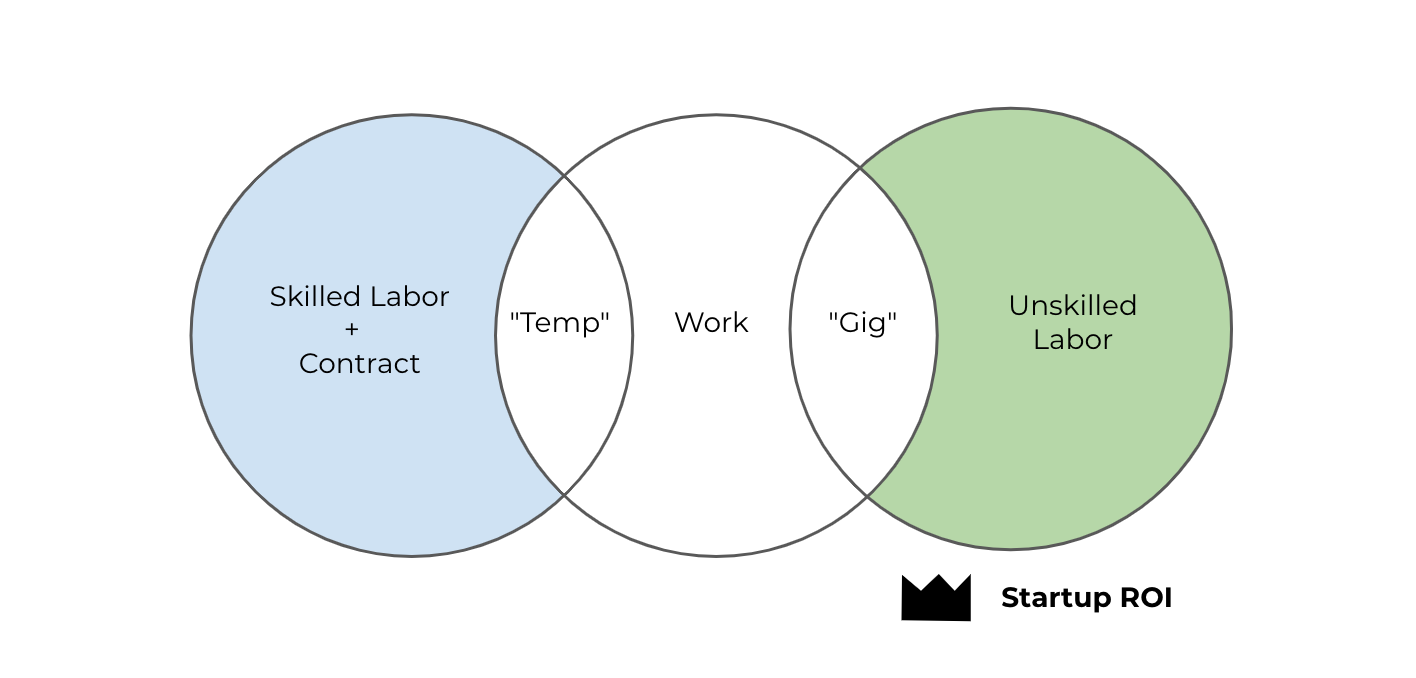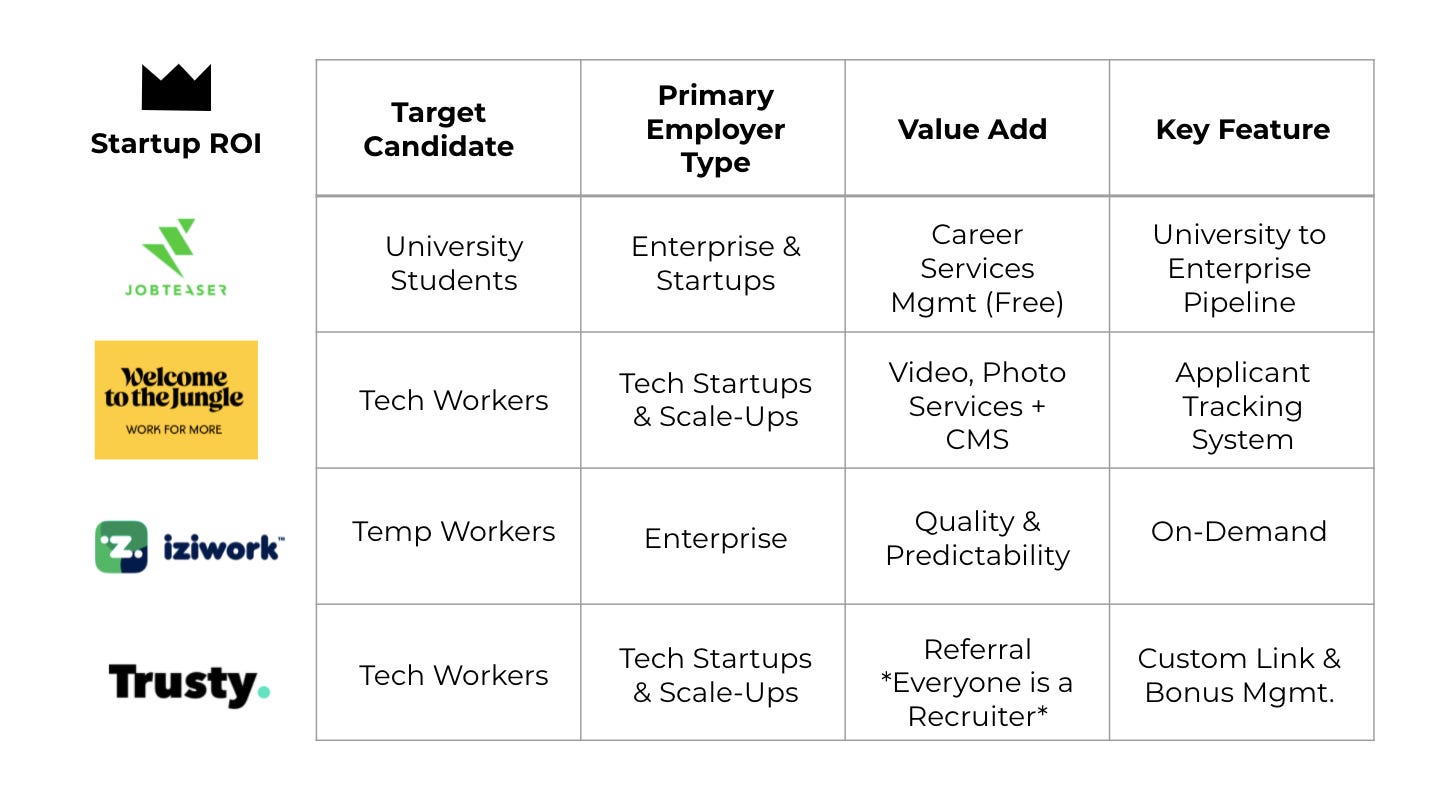Welcome to Startup ROI, where we explore global technology trends and how they manifest themselves in France 🇫🇷 . Whether you're an entrepreneur, investor or tech enthusiast, I'm glad to have you here! 📩 Get in touch
📌 If you are a startup interested in being featured or a VC interested in collaborating, please reach out directly: bonjour@startup-roi.com
Mic check! 🎧 Listen to the audio version:
New here? Subscribe to get Startup ROI each Tuesday:
Introduction: Enter the Real World
I spent the better part of last week thinking back on my experience entering the job market. To say I was lucky was an understatement. I had the credentials of a name brand school, the financial and emotional support of my parents, and an economy starting to recover from the 2008 financial crisis (I graduated in 2013). Nevertheless, I don't recall feeling super prepared for entry into the job market, nor did I really know what exactly I wanted to do. My degree was in Economics but I had no interest in becoming an economist. I had completed a couple of internships that seemed to confirm my assumption that I couldn't survive in a cubicle and reinforced my desire to join a tech startup. I was computer savvy but not a developer and I'll never forget the distinct fear that my non-technical background would be my kryptonite. I remember prepping for interviews with buddies who would dig up questions from last year's Google interview manual which asked things like "how many fire hydrants are there in the continental United States?" not so much for a correct answer but to watch your logic and reasoning in real time (while likely suffering a minor panic attack).
The job market is always in flux which makes it difficult for even the most well connected people to navigate the system. For those in less fortunate situations, it's downright daunting. We've talked about the future of work, but today I'd like to discuss the present. In this essay, we review the ever-changing job landscape and uncover the French Tech companies hoping to reduce friction at all career stages.
The Perfect Candidate Doesn't Exi-...
Picture this: "Candidate A" was given a full scholarship to a gifted high school, received an electrical engineering degree from a respectable university, joined the Navy and then started and finished their career at General Electric. Sounds like a pretty perfect match for both Candidate A and GE, doesn't it? There's only one problem. This candidate doesn't exist anymore. Why, you ask? Because this is the profile of my grandfather who was born in 1929, raised during the Great Depression, and went to college in the Post WWII era. Times have changed and so have preferences on both sides of the job market.
To explain these changes we'd need a longer essay. In short, it can be attributed to politics, economics and technology. There are many ways that politics and technology have evolved over the last half century, but economics (macroeconomics, that is) has remained largely the same. One steady, albeit lagging, economic indicator is the unemployment rate, something we've measured consistently since the Great Depression Era (so about as old as my grandfather would be today). We'll dive into the implications of this statistic later on, but for now it's important to note that there are three different types of unemployment, and from my point of view, they paint a pretty clear picture of our current job market.
Cyclical Unemployment is correlated with the business cycle, the booms and busts of the economy — good economy = lots of job, bad economy = fewer jobs available
Structural Unemployment refers to a changing landscape in which technological shifts and/or missing skill sets lead to job loss — think: the robots are taking over…
Frictional Unemployment is the in between period when someone leaves a job in search of something different or better i.e. voluntary employment transition
It's this final category that best explains what's happening in the job market today and how companies, job seekers and recruiting platforms are adapting to service modern preferences.
WE WANT YOU! (20th vs 21st Century Recruiting Tactics)
Fundamental changes in the economy require fundamental shifts in the job market. Recruiting and hiring has been a historically complex and illiquid process. And as you progress from unskilled or low-skilled labor to highly specialized work, this process becomes even more challenging. Part of the reason entering the workforce is so daunting is because you're not even sure where to begin. Universities often host a job fair or post listings on their Career Center site, but I tend to find them stale, awkward and antiquated. I was lucky enough to graduate in the internet era, yet I can't help but think about what it might have been like perusing the classifieds in search of an entry level position at ACME Corp. or knocking on doors handing my crisp resume to every secretary in town. Thankfully, we've made progress on this front. The first step was to take the physical job board and put it online. Soon after, we saw the emergence of social media and online professional networks. But in a highly competitive, tech-enabled job market, a newer generation of recruiting tools have emerged to satisfy the requirements of applicants and HR teams alike.
So how do we reduce friction in the job market? Applicants are looking for a company with values that align with their own, a mission they can believe in and benefits that are competitive. For enterprises, it's about finding employees who buy into their mission, can make an outsized contribution and will join for the long-term. Companies are seeking to differentiate themselves to attract top-tier talent in an effort to increase employee retention. Below are the job marketplaces helping them do that here in France.
Jobteaser: The University Pipeline
The meme above just about perfectly captures the irony of entering the job market. As a recent graduate, it's like you're starting over, a Freshman once again, just this time in the real world. So what gives? I had the chance to sit down with Jean-Côme Larher, Chief of Staff at Jobteaser who gave me insight from his perch, nestled between The University and The Enterprise. Jobteaser has become the go-to job portal for university students in Europe. As illustrated above, there are several places to search for jobs, but Jobteaser has narrowed their focus on a specific vertical in order to curate for their audience (students) and deliver results for their customers (enterprise companies). This strategy is taken right from the playbook I described in a previous post on the Unbundling of Leboncoin: take a generalized marketplace and build tools for a specific user group to enhance quality, community and outcomes. Compared to LinkedIn, for example, Jobteaser has zero ads and is exclusively career focused. They partner with universities and offer a free Career Services Management System (CSMS) and then charge Enterprise Co's for access to the pipeline of candidates.
My conversation with Jean-Côme revealed three primary axes of interest for both parties in the job market (think of them as the filters you use to find a good match). In France's rigid labor market, things like contract and salary are critical for advancing the conversation. But I got the impression that a 4th Axis is emerging. Just as companies aim to differentiate to improve retention, job seekers are filtering for companies with values and missions aligned with their own. This new vector will have a profound impact on the job market in the coming decade.

Welcome to the Jungle: Value-Based Differentiation
My first encounter with a job marketplace company in France was with WTTJ. At a previous startup here in Paris, we hired them to boost our recruiting efforts. They pair an intuitive product (job board with filters) and premium services (professional photographers, videographers, graphics) to help you stand out from the crowd. Testimonial-style videos from employees and executives to talk about why they love their job, a lightweight CMS to showcase your vision and values for the company, plus a back-end applicant tracking system to manage your candidate pipeline and hire faster. They've become the go-to system for most tech startups in France and have the media chops to prove their value. Their new slogan "Work for More" quite clearly alludes to jobseekers' demands for meaningful work, especially in the upper echelon of the tech industry.
Iziwork: The On-Demand Economy
We now live in a world where you can open up your mobile phone and basically find work on demand. That's pretty incredible. But it comes with some downsides for workers as we've seen with recent bad press from French delivery startup Frichti. The gig economy has led to some dystopian results, but Iziwork aims to bring some dignity and predictability back to the temporary job market. Before the gig economy became popularized, it was common to hear about temp agencies and work that didn't require a full-time contract. I would argue that the difference between "gig" work and "temp" work can be equated to unskilled versus skilled labor. Iziwork claims to have over 1M users actively seeking temporary work via the app and raised a €35M Series B earlier this year to expand on their foundation and give temporary workers the flexibility they want and the consistency they need.
Trusty: Network Effects
We tend to think of network effects as powerful when building a social app or two-sided marketplace. But they can also be leveraged to build trust and attract talent. For years, companies have offered referral bonuses to employees who could bring on friends or former colleagues. The single degree of separation saves time headhunting, filtering through applications and generally serves as a proxy for a qualified candidate considering a current employee is putting their reputation on the line to boost their referral's profile. But setting up a system and tracking for compensation has always been a challenge. Trusty aims to reduce complexity and increase candidate pipeline and retention by giving every employee on your team the power to be an ambassador and recruiter. This model works well at the startup phase and aligns quite neatly with our framework for the modern job market.
FUN-employment & Other Stories
In full transparency, this section is a bit econ-heavy but I've sprinkled in some memes to make it a bit more digestible.
The labor force participation and unemployment rate are critical indicators for the health of a particular economy. A stable economy requires those that can contribute, to contribute. But that's not always the case.
As I mentioned, the unemployment rate is what we call a lagging indicator in economics, meaning it illustrates market dynamics after the fact (reactive as opposed to predictive data). It is closely tied to the "business cycle" of expansion and contraction, boom and bust, economic growth and recession. In the US, the Bureau of Labor Statistics has been measuring this data consistently since 1929 (The Great Depression). If you're interested, you can check out this table showing the various rates of unemployment year over year in the US and the complementary events or policies that affected the market.

If your eyes glazed over, I understand. The main point is this: unemployment is a significant measure of economic activity. We measure it. We analyze the trends. We determine economic policy as a result. The reason it's valuable in today's conversation is because employment and the nature of work is fundamentally changing. These measures that have been the backbone of our economic policy for nearly a century may start to get challenged. A rapidly changing job market, technological innovation, global pandemic and micro-economic incentives are bringing the new era of work into focus. And it's quite different from what we're accustomed to. Not only is the way we seek jobs changing, but our fundamental relationship to work is evolving.
Get a Job They Said, It Will be Fun They Said…
In the US our identities tend to be wrapped up in our careers (less so in France) — so it's important as the economy transitions through digital transformation that everyone can find work that is engaging and personally meaningful. The companies we covered today are important tools for streamlining that process. If you’re looking for work in France, reach out and maybe I can help you achieve the serenity of spider man at his desk.



















